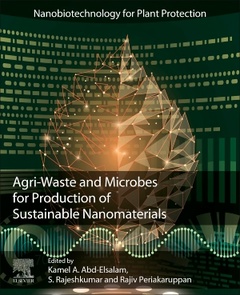Agri-Waste and Microbes for Production of Sustainable Nanomaterials Nanobiotechnology for Plant Protection Series
Coordonnateurs : Abd-Elsalam Kamel A., Periakaruppan Rajiv, Rajeshkumar S.

Agri-Waste and Microbes for Production of Sustainable Nanomaterials assesses the most recent trends used to produce bionanomaterials from agricultural waste and microorganisms. The book covers the green synthesis of various nanomaterials using microorganisms and agricultural waste, including the synthesis and characterization of green nanomaterials, the production of nanomaterials from agri-waste, including metallic, copper, silica, cellulose, nanopolymers and nano/micro plastics, and biological methods such as agricultural and microbial synthesis of metallic/metal oxide, magnetic, silver, copper, nanomaterials and nanonutrients. This is an important reference source for plant scientists, materials scientists and environmental scientists who want to understand this new generation of sustainable nanomaterials.
The synthesis of nanocellulose materials from agri-wastes is an emerging alternative for waste treatment methods, developing new biosensors and antimicrobial agents. Silicon nanoparticles are an additional ingredient for the improvement of crop yields. With recent advances in nanomaterials synthesis performance and the discovery of their biomedical, environmental and agricultural applications, it is hoped that the implementation of these methods will be used at large-scale for industrial applications in different sectors.
1 Sustainable strategies for producing large-scale nanomaterials: A note from the editors
Part I: Agri-Waste for production of nanomaterials
2 Synthesis of metal nanoparticles by microbes and biocompatible green reagents 3 Plant and agri-waste-mediated synthesis of metal nanoparticles 4 Plant-mediated copper nanoparticles for agri-ecosystem applications 5 Synthesis of silica nanoparticles from agricultural waste 6 Biomolecule-assisted biogenic synthesis of metallic nanoparticles 7 Bacterial and fungal mediated synthesis, characterization and applications of AgNPs 8 Agro-waste materials: Sustainable substrates in nanotechnology 9 Synthesis of eco-friendly graphene from agricultural wastes 10 Fruit peel waste-to-wealth: Bionanomaterials production and their applications in agroecosystems 11 Eggshell and fish/shrimp wastes for synthesis of bio-nanoparticles 12 Vegetables waste for biosynthesis of various nanoparticles
Part II: Microorganisms for nanomaterials synthesis
13 Microbes and agricultural waste: A safe resource for the production of bionanomaterials 14 Microbial synthesis of magnetic nanomaterials 15 Mycogenic nanoparticles: Synthesis, characterizations and applications 16 Actinomycetes-assisted nanoparticles: Synthesis and applications 17 Biosynthesis of Silver Nanoparticles: Synthesis, mechanism, and characterization 18 Agri-food and environmental applications of bionanomaterials produced from agri-waste and microbes 19 Benign fabrication of metallic/metal oxide nanoparticles from algae 20 Biogenic metal sulfide nanoparticles synthesis and applications for biomedical and environmental technology 21 Microbial-mediated copper nanoparticles synthesis, characterization, and applications 22 Green nanomaterials produced by agro-waste and microbes: Mechanisms and risk assessment 23 Frontier and perspective outlook on agrowaste nanoparticles for healthcare and environment 24 Mechanistic approach on the synthesis of metallic nanoparticles from microbes 25 Microbially synthesized nanoparticles: A promising future for insecticidal efficacy studies 26 Biomedical applications of ginsenosides nanoparticles synthesized using microbes 27 Synthesis of selenium nanoparticles by using microorganisms and agri-based products 28 Plant-meditated methods for synthesis of silver nanoparticles 29 Rice wastes for green production and sustainable nanomaterials: An overview
eco-friendly hybrid nanomaterials. Since 2019, he has served as the Editor-in-Chief of the Elsevier
book series Nanobiotechnology for Plant Protection.
P. Rajiv is a Doctor of Philosophy at the Department of Biotechnology, Karpagam Academy of Higher Education, India. His research interests are environmental biotechnology, nanotechnology. biofertilizer technology, microbiology and food technology, organic farming, and crop improvement.
S. Rajeshkumar is an Associate Professor at the Department of Pharmacology at the Saveetha Institute of Medical and Technical Sciences, India. His research interests are green synthesis of silver, gold, zinc oxide, cadmium sulfide, zinc sulfide, titanium di oxide, copper sulfide, copper oxide, chitosan and silica nanoparticles and polymer coated metal nanocomposites. He is also researching applications of nanoparticles and nanocomposites on agricultural and biomedical applications (antimicrobial, anticancer, antioxidant, anti-inflammatory, antidiabetic etc.)
- Highlights recent methods to produce bionanomaterials from agricultural waste and microorganisms
- Explores the use of agri-waste in environmental and agricultural applications
- Assesses the major challenges for using agri-waste to create eco-friendly nanomaterials at large scale
Date de parution : 10-2021
Ouvrage de 772 p.
19x23.4 cm
Thème d’Agri-Waste and Microbes for Production of Sustainable... :
Mots-clés :
Agri-Waste; Microbes; Green Nanomaterials; Biogenic Nanoparticles



